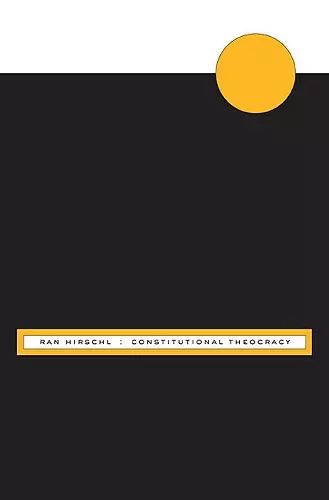Constitutional Theocracy
Format:Hardback
Publisher:Harvard University Press
Published:1st Dec '10
Currently unavailable, and unfortunately no date known when it will be back

A tour de force. Ran Hirschl's powerful analysis convincingly demonstrates that constitutionalism encompasses constitutional theocracy as well as constitutional democracy, that constitutional theocracy is becoming a dominant form of constitutionalism globally, and that this conflation of constitutional and religious values may have underappreciated virtues (and vices). -- Mark Graber, University of Maryland School of Law Ran Hirschl proves himself to be among the leading scholars of comparative constitutionalism writing today, and his signal contribution is to develop and analyze a distinctive form of constitutional polity, "constitutional theocracy." Anyone interested in the interaction of law and society will certainly need to read this book and will find themselves fascinated by the stories about developments in Iran, Pakistan, India, Israel, and Turkey, to name only five of the countries Hirschl analyzes in depth. -- Sanford Levinson, University of Texas at Austin School of Law Inevitably this book will raise hackles - given its critically important subject how could it be otherwise? But Hirschl is learned in exposition and acute in analysis. He demonstrates the same superb comparative skills familiar from his previous classic. -- JHH Weiler, Editor-in-Chief, I-CON The International Journal of Constitutional Law
Presents a comparative analysis of religion-and-state jurisprudence from dozens of countries worldwide to explore the role of constitutional law and courts in a non-secularist world.
At the intersection of two sweeping global trends—the rise of popular support for principles of theocratic governance and the spread of constitutionalism and judicial review—a new legal order has emerged: constitutional theocracy. It enshrines religion and its interlocutors as “a” or “the” source of legislation, and at the same time adheres to core ideals and practices of modern constitutionalism. A unique hybrid of apparently conflicting worldviews, values, and interests, constitutional theocracies thus offer an ideal setting—a “living laboratory” as it were—for studying constitutional law as a form of politics by other means. In this book, Ran Hirschl undertakes a rigorous comparative analysis of religion-and-state jurisprudence from dozens of countries worldwide to explore the evolving role of constitutional law and courts in a non-secularist world.
Counterintuitively, Hirschl argues that the constitutional enshrinement of religion is a rational, prudent strategy that allows opponents of theocratic governance to talk the religious talk without walking most of what they regard as theocracy’s unappealing, costly walk. Many of the jurisdictional, enforcement, and cooptation advantages that gave religious legal regimes an edge in the pre-modern era, are now aiding the modern state and its laws in its effort to contain religion. The “constitutional” in a constitutional theocracy thus fulfills the same restricting function it carries out in a constitutional democracy: it brings theocratic governance under check and assigns to constitutional law and courts the task of a bulwark against the threat of radical religion.
A tour de force. Ran Hirschl's powerful analysis convincingly demonstrates that constitutionalism encompasses constitutional theocracy as well as constitutional democracy, that constitutional theocracy is becoming a dominant form of constitutionalism globally, and that this conflation of constitutional and religious values may have underappreciated virtues (and vices). -- Mark Graber, University of Maryland School of Law
Ran Hirschl proves himself to be among the leading scholars of comparative constitutionalism writing today, and his signal contribution is to develop and analyze a distinctive form of constitutional polity, "constitutional theocracy." Anyone interested in the interaction of law and society will certainly need to read this book and will find themselves fascinated by the stories about developments in Iran, Pakistan, India, Israel, and Turkey, to name only five of the countries Hirschl analyzes in depth. -- Sanford Levinson, University of Texas at Austin School of Law
Inevitably this book will raise hackles - given its critically important subject how could it be otherwise? But Hirschl is learned in exposition and acute in analysis. He demonstrates the same superb comparative skills familiar from his previous classic. -- JHH Weiler, Editor-in-Chief, I-CON The International Journal of Constitutional Law
Hirschl brings a wealth of understanding of comparative judicial politics in numerous contexts... [Constitutional Theocracy] proceeds to explore the implications of the constitutional embrace and limitation of religion, arguing that constitutionalism and theocratic government work hand-in-hand in both secular and theocratic contexts. It holds that secular elites in particular make use of legal texts as a means of consolidating their rule in all such societies, whether officially religious or secular...Hirschl's work is unique and extremely important. It is a must-read for all scholars of religion and legal politics. -- P. Rowe * Choice *
ISBN: 9780674048195
Dimensions: unknown
Weight: unknown
314 pages